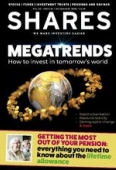Archived article
Please note that tax, investment, pension and ISA rules can change and the information and any views contained in this article may now be inaccurate.
Five dangers to watch in 2020

One of this column’s favourite aphorisms from master investor Warren Buffett (and there are admittedly quite a few of those) is: ‘speculation is most dangerous when it looks easiest’.
The strong returns offered by most asset classes in 2019 could tempt some investors to think making money is easy and yet American foreign policy in the Middle East means that equities are already off to a bumpy start this year.
Even if gold and oil are proving to be useful ports in the storm, it may just be worth considering what could derail stock markets in 2020, since portfolio construction should focus on risk and downside protection as much as it does reward.
FIVE AGAINST THE FIELD
Investors can doubtless think of others things that worry them but in this column’s opinion any one of the following five developments would constitute a potentially nasty shock for stock markets after 2019’s substantial gains:
1. US-China trade talks break down
One of the biggest sources of volatility has been the trade dispute between America and China. Hopes for a resolution – and a rolling back of tariffs – have grown, thanks to president Donald Trump’s tweets that a ‘phase one’ deal will be struck by 15 January.
This leaves markets exposed to any delay or any moves by China to carry on regardless, especially on the vexed issue of its treatment of Western intellectual property. Data from the CPB in the Netherlands shows how global trade flows are slowing and industrial transportation equity indices are lagging (which is not normally a good sign), so an elongated disagreement between Washington and Beijing could be bad news.
2. Oil prices spike
This one does not seem quite so fanciful after America’s move to attack an Iranian general on Iraqi soil, as Brent crude is already nudging the $70-a-barrel mark amid heightened tensions in the Middle East.
History shows that if oil jumps by more than 50% year-on-year the global economy tends to slow and if it doubles then a recession is rarely far away, because of the hit to consumer spending power and corporations’ cost bases. The good news is that oil is basically flat on where it was a year ago and it would need to exceed $90 to rise by 50% so markets still have some leeway.

3. Corporate earnings disappoint
One oddity of the equity bull run has been how profit growth has been modest, even as share prices have surged.
America’s S&P 500 may have advanced by more than 20% last year but corporate earnings rose by just 4%, according to data from the Federal Reserve, whose numbers also suggest US private sector profits are not much higher than they were in 2012. The implication is that share buybacks and financial engineering have therefore done a lot to goose earnings per share numbers.
Aggregate earnings for the FTSE 100 were no lower in 2019 than they were in 2011, according to analysts’ estimates. This means valuations (the ‘P’ in price-to-earnings or PE calculations) have risen faster than the ‘E’ and that could leave share prices looking exposed if earnings start to disappoint – because of something like a slump in trade or spike in oil.

4. Inflation
A low-growth, low-inflation, low-interest rate world has left investors scrabbling for yield and for returns better than cash for a decade, with equities a big winner as a result. Recent performance from bonds and equities alike suggests investors expect the next decade to offer more of the same so a spike in inflation could be big surprise.
Inflation would work against so many of the best strategies of the last 10 or even 30 years – bonds, long-duration assets such as tech stocks – and force investors to reassess. The last real inflationary period was the 1970s when gold protected investors’ wealth in real terms and equities did not.

5. Tighter monetary policy
Since falling rates helped to persuade investors to look beyond cash in 2019 this would perhaps be the biggest surprise of all (and it would probably be preceded by an unexpected surge in inflation, which could perhaps result from ultra-loose monetary policy combined with a relaxation of fiscal policy). The Fed turned on the taps again in 2019 and it seems to have helped so it will be interesting to see what happens when the US central bank stops intervening in the overnight repo market.
CONCLUSION
This is not to say that all, or any, of these dangers will come to pass but if any of them do then portfolios may need to be calibrated accordingly. At the very least, assuming what has worked for the last 10 years will provide a repeat performance in the 2020s could be dangerous and investors might like to ensure they have balanced, diversified portfolios which can protect them, and profit, from a range of scenarios and not just one.
Important information:
These articles are provided by Shares magazine which is published by AJ Bell Media, a part of AJ Bell. Shares is not written by AJ Bell.
Shares is provided for your general information and use and is not a personal recommendation to invest. It is not intended to be relied upon by you in making or not making any investment decisions. The investments referred to in these articles will not be suitable for all investors. If in doubt please seek appropriate independent financial advice.
Investors acting on the information in these articles do so at their own risk and AJ Bell Media and its staff do not accept liability for losses suffered by investors as a result of their investment decisions.

 magazine
magazine








